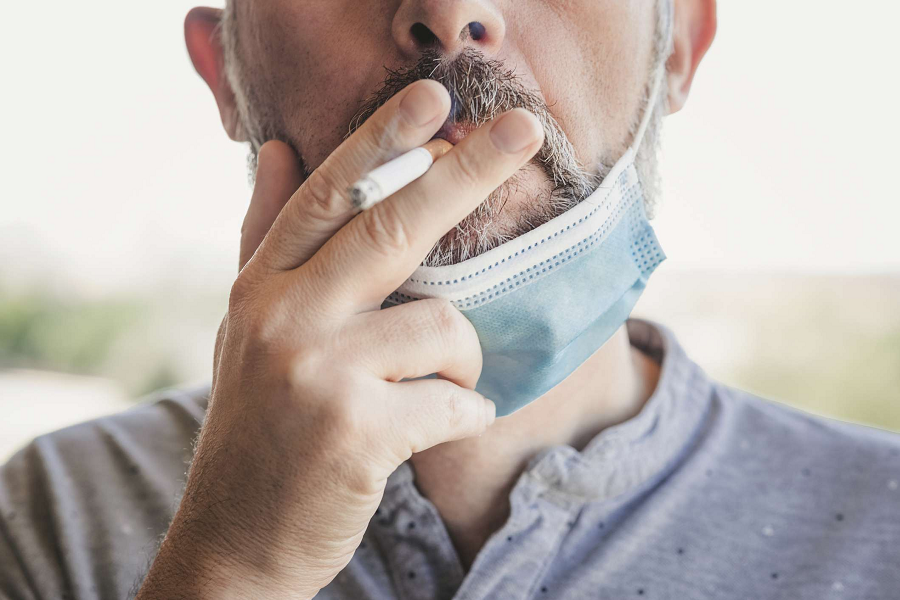
Cigarette smoke is an established risk factor for numerous respiratory infections and worsens the severity of respiratory disorders. A review of studies conducted by public health specialists assembled by WHO on April 29, 2020 discovered that smokers are more likely than non-smokers to suffer serious disease from COVID-19.
COVID-19 is a viral infection that predominantly affects the lungs and potentially causes irreversible damage to lung cells and tissues. It is essential to prevent getting COVID-19 in the first place, but it is also critical to do all necessary to preserve our lungs’ health in order to avoid the disease’s potentially fatal consequences.
Even without COVID-19, each and every year, cigarettes kill more than 8 million people worldwide. Roughly around 7 million of these fatalities are caused by direct smoking, whereas around 1.2 million are caused by nonsmokers being exposed to second-hand smoke.
Why Smokers More Prone to Severe Symptoms And Complications?
Cigarette smoking, vaping and tobacco use can reduce lung capacity and increase the risk of numerous respiratory infections, as well as the severity of respiratory diseases. COVID-19 is a viral infection that primarily affects the lungs; as a result, decreased lung capacity may exacerbate respiratory symptoms such as shortness of breath, coughing, chest tightness, and so on.
Furthermore, to keep bacteria and viruses away, our lungs rely on its natural defence systems. This comprises the usual mucus coating on our airways, as well as countless tiny hairs or cilia linings that sweep in a pattern to excrete mucus and debris out of our lungs. Beside the mechanical defence mechanism, there are immune cells circulating in our airways as well, taking the role of defending against any invading viruses and bacteria so that our lungs may function correctly.
The chemical compounds produced when smoking or vaping will inadvertently induce lung tissue damage and hence reduce lung function. Because any damage to the lung tissues will be replaced by hard fibrous tissue, which is also known as scars tissue, the mechanical defence system of the lungs will be unable to operate normally. These chemicals and nicotine will also impair the body’s immune system, producing sluggish immunity in the body and lungs, making the battle against coronaviruses and other respiratory diseases more difficult.
How Can I Avoid Severe COVID-19 Symptoms And Complications?
The first approach should undoubtedly be to avoid as many risk factors as possible. In order to accomplish this, we must maintain the health of our lungs, protect their function through smoking cessation, and discontinue vaping. Aside from that, rigorously adhere to the SOP by taking care of our hygiene, sanitizing our hands, maintaining social distance, and wearing medically certified facemasks. These are the most important precautions to take in order to avoid COVID infection and reduce the chance of the virus spreading. Nonetheless, receiving the Covid 19 vaccine is the current gold standard for COVID-19 prevention, and it is widely available for the majority of the public; only those at risk of angioedema or allergy will require extra caution.
Fortunately, at least 5 COVID-19 vaccinations are accessible in Malaysia, which is now being disseminated throughout the country in phases. As mentioned, PfizerBioNTech (Comirnaty), Sinovac (CoronaVac), Oxford-AstraZeneca (ChAdOx1-S), Janssen (Ad26.COV2-S), and CanSinoBio (Convidecia) are the vaccine manufacturing brands approved by the government. It is highly obligatory to relate with the Ministry of Health and make sure to take part in the COVID immunization programme.
How to Quit Cigarette Smoke?
According to the most recent research, smokers are at a greater risk of developing severe COVID-19 symptoms and complications. As a result, consider this as an opportunity and a breakthrough to quit smoking and live a healthier lifestyle. The steps to accomplish the same are given below:
- Determine your smoking triggers. For example, if you are alone or travelling a long distance to or from work, you may be more prone to light up. Social isolation and working from home may give the ideal time to break the spell and focus on quitting.
- Refresh your surroundings and your day. Making modifications to your house and living space might help you recall certain smoking cessation routines, whether it’s a special chair on the porch or any of your beloved collections.
- Keep your connection active. Hangouts are getting more virtual these days, which provides a fantastic chance to engage with those who are quitting smoking. You should consider joining online support groups and quarantine quitters.
- Obtain trustworthy help. Participate in a quit smoking programme that will guide you through the process of quitting smoking step by step. As part of the programme, you will have access to smoking cessation counsellors who will advise and assist you.
- You may always seek medical advice and assistance from a doctor. Many doctors have dealt with smokers in the past; open up and the medical experts may guide you through the smoking cessation process.

